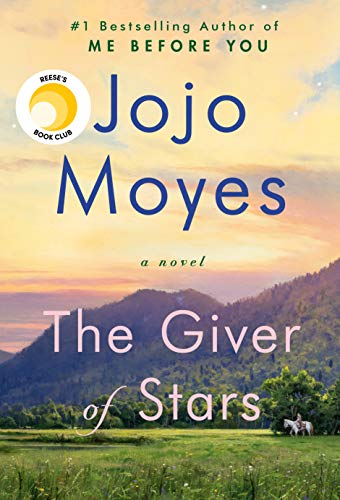People often share with me articles such as this one about the Kentucky Packhorse librarians, one of President Roosevelt's Works Progress Administration (WPA) projects. During the Great Depression these bad-ass librarians rode through rough mountain terrain in all weather in order to deliver books to rural Kentuckians. Moyes' novel tells the story of Margery O'Hare, Alice Van Cleve, Sophia Kenworth, Beth Pinker, Kathleen Bligh, and Isabelle (Izzy) Brady who took on the challenge of ensuring all in the mining town Baileyville could access reading materials.
Not everyone in town was happy about the set up. There were those who were not happy that Sophia a "colored" woman was working in the library. And some residents preferred that the librarians not bring any reading materials to their families (except perhaps the Bible), lest they "spread all kinds of crazy notions". Nevertheless even amid reports of
wives no longer keeping house because they're too busy reading fancy magazines and cheap romances...[and] children picking up disruptive ideas from comic books
the librarians took their charge seriously, and delivered materials to homes and schools across the mountainside.
Newlywed Alice volunteered for the duty despite the vigorous objections of her husband and father-in-law who felt that as a proper woman she should stay home. The Van Cleve men, along with Pastor McIntosh and his sister Pamela also insisted that the horse riding was interfering with Alice's ability to have children. "It's like if you shake a jar of milk up too much, it turns sour. Curdles, if you like". Explains the clueless elder Mr. Van Cleve. Pastor McIntosh adds that he'd in fact read an article indicating as much. Although Alice is a bit naive about certain sexual matters, she is well aware of the real reason she hadn't conceived, and it had nothing to do with horseback riding. Rather than pointing out her husband's disinterest in sex she instead launches into an explanation of the importance of information literacy.
Knowledge is so important, don't you think? We all say at the library, without facts we really do have nothing. If I'm putting my health at risk by riding a horse, then I think it would only be responsible for me to read the article you're talking about. Perhaps you could bring it next Sunday, Pastor?Alice further points out that
in England [whence she hails] nearly all well-brought up ladies ride. They go out hunting, jumping ditches, fences, all sorts. It's almost compulsory. And yet they pop out babies with extraordinary efficiency. Even the Royal Family. Pop, pop, pop!One of the more popular books in the library was a discretely requested manual called Married Love by one Dr. Marie Stopes. The women who ventured to read the work found that their husbands spent less time at the honky tonks and more time at home "shorn of their usual short tempers".
It even worked for those women who preferred not to be married. Margery O'Hare read it twice and she and her beau Sven Gustavssen and made good use of the advice therein. Curious? You can read the whole thing here.
This book has something for everyone - murder, romance, intrigue, censorship, and more. My husband and I listened to the audio version. An excellent tale it is.
See also my post for That Book Woman for a children's picture book about the Packhorse librarians.



